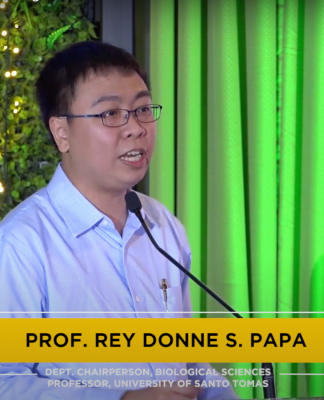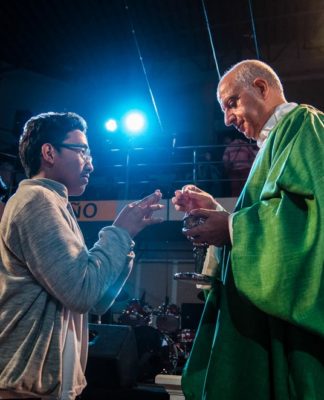POPE JOHN Paul II once wrote that faith and reason were the wings which the soul used to fly to the light of the infinite. But these seemingly different faculties need not contradict each other but rather work harmoniously, as proven by St. Thomas Aquinas.
Graduate School Regent Fr. Jose Antonio Aureada, O.P. argued that contrary to wrong impressions, St. Thomas was “not through and through Aristotelian.” His works were attached to Aristotle’s concept of man as a rational animal, but he was able to reconcile faith and reason in his works. In fact, Aureada described St. Thomas as someone who used Philosophy to help him understand the Christian faith.
“He (St. Thomas) had such a synthesizing mind,” Aureada said in the St. Thomas Aquinas forum titled “Theology and Philosophy: friends or enemies?” held at the Martyr’s Hall last February 12. “He would welcome opposite points of view in philosophy so that his synthesizing ability could work the math.”
The annual forum in honor of the Feast of St. Thomas delved into the relationship between Theology and Philosophy in a Catholic university setting. It was attended by Philosophy majors, Central Seminary students and professors of the Institute of Religion .
Inter-related faculties
For Fr. Enrico Gonzales, O.P., former dean of the Faculty of Philosophy, UST was a testimony that both faculties could exist in harmony, citing that the first two faculties founded in the University were the Faculties of Theology and Philosophy.
“This University has existed for 400 years because there is a friendly relationship between Theology and Philosophy,” he said in the forum organized by the Institute of Religion, and Faculty of Arts and Letters (Artlets). “They have been like that ever since this University existed.”
Gonzales noted that both disciplines need not be dichotomized because both of them were inter-related.
“Faith becomes dynamic because you inquire,” he said. “We should be holistic in the way we see reality.”
Thomasians should also be thankful that the University offers both Theology and Philosophy curricula, giving them a “complete set of knowledge” derived from using faith and reason, he said.
On the contrary, Artlets professor Reynaldo Reyes had a different outlook: it is through faith’s intellectual engagement with Philosophy that Sacred Theology is born.
Sacred Theology is a science about God, in which conclusions are derived from two premises?reason and faith. As Pope John Paul II puts it in his encyclical Fides et Ratio, “the Church considers philosophy as an indispensable help for a deeper understanding of faith.” It is through proving and confirming a principle that reason helps to understand faith.
Reyes discussed the incompatibilities of faith and reason, but also cited three main reasons why both could be compatible.
“God can be the object of faith and reason,” he said. According to him, God becomes the object of faith known as religion, “when supernatural truths are accepted as revealed or taught to man by God or through his prophets.” However, God becomes the object of reason, loosely called Philosophy of Religion, when truths about God are proved using reason alone.
Secondly, faith should be considered as the “middle way between opinion and science.” Man, by reason, can either have an opinion about God (one which lacks full support from reason but is inclined to accept it as true) or a science about God (which is based on “reasonable grounds so compelling to accept the conclusions about God firmly).” St. Thomas said that the latter possesses certitude resulting from the understanding of principles, while faith is in the middle, surpassing opinion with its firm adherence but lack of reason.
Finally, Reyes stressed that reason systematized faith. As supernatural truths are accepted by faith, reason can and ought to understand them.
Allan Basas of the Institute of Religion echted this compatibility, saying that Theology needed Philosophy but said the latter should not be reduced as a mere tool for the understanding of Theology.
“For as long as we will be talking to human beings about Theology, there will be a need for Philosophy,” he said. “Theology is in need of a method that would allow its content to come out in a way that is understandable to human beings.”
Robert Montaña of Artlets’ department of philosophy discussed the delicate task professors had in teaching anti-religious philosophies to Catholic students.
“The first real step toward handling [this task] is for the professor not to be perplexed himself,” he said. “If he keeps on deliberating upon matters which he himself cannot answer, then his very own confusion overflows to the students, leaving more questions than answers.”
He added that to integrate one’s philosophy in his own faith is dangerous. One can only attempt to do so “unless he is really knowledgeable of his faith that he can tamper with it but not lose it.” Florench May C. Corpuz

















